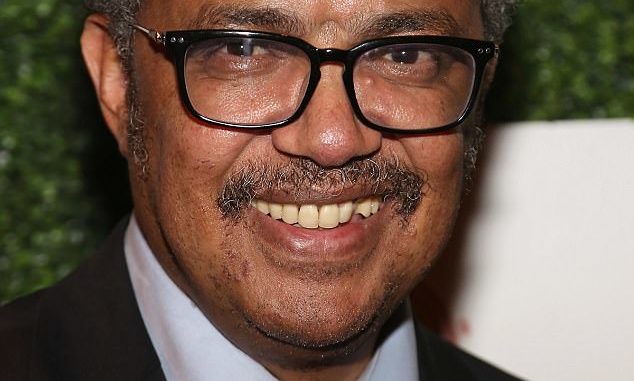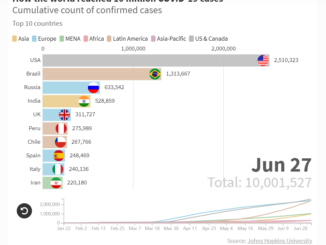
Dr Tedros Adhanom is the director general of the World Health Organization
He claims the next outbreak will be ‘terrible’ on humans and the economy
Dr Tedros was speaking at the World Government Summit in Dubai this week
Humanity is ‘vulnerable’ to a pandemic that could kill millions, the chief of the World Health Organization has warned.
Dr Tedros Adhanom, director general of the WHO, claims the next outbreak will have a ‘terrible toll’ on the population and economy.
Fears of a pandemic have mounted lately, following the worst flu outbreak in recent years that has rocked the US, Australia, France and the UK.
A plague outbreak in Madagascar last November also shook the medical community, and left them concerned it would spread across the world rapidly.
While the most recent pandemic, mosquito-borne Zika virus, struck 70 countries in 2016 and took concerned scientists by surprise.
Speaking about the threat of another at the World Government Summit in Dubai earlier this week, Dr Tedros said: ‘This is not some future nightmare scenario.
‘A devastating epidemic could start in any country at any time and kill millions of people because we are still not prepared. The world remains vulnerable.’
He added: ‘We do not know where and when the next global pandemic will occur, but we know it will take a terrible toll both on human life and on the economy.’
Dr Tedros, from Ethiopia, became the first African to hold the chief post at the WHO when he was appointed in May 2017.
But he sparked controversy after appointing despot Robert Mugabe a ‘goodwill ambassador’ – despite life expectancy in Zimbabwe plummeting under him.
At the time, he credited Mugabe for prioritising universal health care. And this week he warned the absence of such a system is ‘the greatest threat to global health’.
Dr Tedros also warns flu poses a danger, Futurism reports. The theory was echoed by experts at the World Economic Forum in Davos last month.
The claims came exactly 100 years after the 1918 Spanish flu that claimed 50 million lives and killed three times as many people as World War I.
A mutated strain is the most likely contender to wipe out millions, because it can join together with other strains to become deadlier.

Speaking at the World Government Summit in Dubai earlier this week, Dr Tedros said: ‘This is not some future nightmare scenario (pictured in September)
This process is what sparked the Swine flu pandemic of 2009 – which killed nearly 300,000 people across the world after striking around 60 countries.
Dr Sylvie Briand, a specialist in infectious diseases at the World Health Organisation, said at the summit: ‘We know that it is coming, but we have no way of stopping it.
‘Humanity is more vulnerable in the face of epidemics because we are much more connected and we travel around much more quickly than before.’
Dr Tedros’ comments follow the plague outbreak in Madagascar – the most recent epidemic to receive international aid attention amid fears it would spread.
More than 200 people were killed during the outbreak that ravaged the island over the winter, which prompted 10 nearby African countries to be placed on high alert.
The most recent pandemic – defined as the worldwide spread of a new disease – was the mosquito-borne Zika virus that rocked South America in 2016.
The infection, which struck 70 countries, can cause microcephaly, or infants born with abnormally small heads. It took scientists by surprise.
And Ebola, a hemorrhagic fever, killed 11,000 in West Africa after it decimated the region between 2014 and 2015. It also reached the US.
The international response to the outbreak drew criticism for moving too slowly, and scientists warned it spread so quickly because of the ease of global travel.
Source:http://www.dailymail.co.uk/health/article-5391477/World-chief-warns-world-unprepared-pandemic.html
Visits: 422




1 Trackback / Pingback